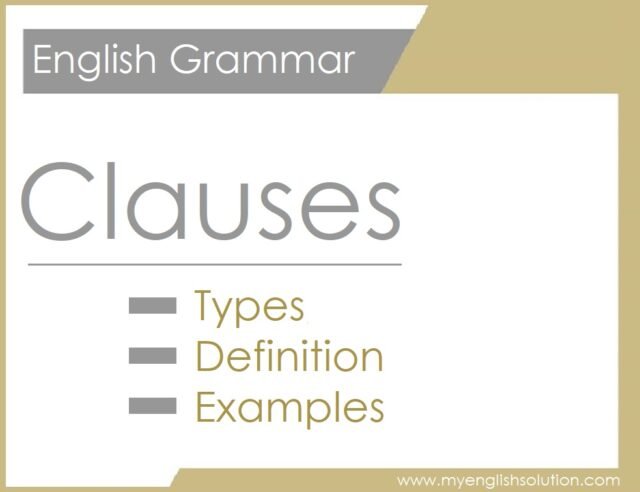Clauses
In grammar, a Clause is a group of words that contains a subject and a verb. It’s like a small sentence within a larger sentence. Clauses can express a complete thought on their own or work together with other clauses to form more complex sentences. A Clause is a group of words containing a subject and predicate and functioning as a member of a complex or compound sentence’.
For example, in the sentence: “She loves ice cream,” the clause is “She loves.” It has a subject “she” and a verb “loves,” and it expresses a complete idea.

Types
There are two main types of clauses in grammar:
1. Main Clause/Independent Clause:
An independent clause is like a complete sentence on its own. It has a subject and a verb and can express a full idea. It doesn’t need any other clauses to make sense. For example: “I like to read books.”
2. Subordinate Clause/Dependent Clause:
A dependent clause is like an incomplete sentence. It also has a subject and a verb, but it cannot stand alone as a sentence. It relies on an independent clause to complete its meaning. For example: “Because I was hungry.” This clause needs an independent clause to make sense, like “I ate a sandwich because I was hungry.”
Independent clauses can stand alone, while dependent clauses need another clause to complete their meaning.

Dependent clauses are further divided into three main types:
- Noun Clauses
- Adjective Clauses
- Adverb Clauses
a) Noun Clauses
A noun clause functions as a noun in a sentence. It can act as a subject, object, or complement.
- What she said was surprising. (Subject)
- I know that he is honest. (Object)
- The problem is that he is late. (Complement)
Common Noun Clause Markers:
that, what, whether, if, why, who, whom, whose, which, how, when, where
b) Adjective Clauses
An adjective clause (also called a relative clause) modifies a noun or pronoun and usually begins with a relative pronoun.
- The boy who won the race is my friend.
- This is the book that I borrowed from the library.
- The lady whom you met yesterday is my aunt.
Common Relative Pronouns:
who, whom, whose, which, that
c) Adverb Clauses
An adverb clause modifies a verb, an adjective, or another adverb. It answers questions like when, where, why, how, to what extent, or under what condition.
- I stayed at home because it was raining. (Reason)
- He ran as fast as he could. (Manner)
- You may go wherever you like. (Place)
Common Subordinating Conjunctions:
because, since, although, if, unless, while, before, after, when, where, as, though, as long as, in order that etc.

Difference Between Phrases and Clauses
Many learners confuse phrases with clauses. A phrase is a group of words that does not contain both a subject and a verb, whereas a clause contains both.
Phrase:
- In the morning (No subject-verb)
- Running fast (No subject-verb)
Clause:
- She runs fast. (Subject: She, Verb: runs)
- When the sun rises (Subject: the sun, Verb: rises)
Sentence Structures Based on Clauses
Sentences can be classified based on the number and types of clauses they contain:
- Simple Sentence: Contains one independent clause.
- She sings beautifully.
- Compound Sentence: Contains two or more independent clauses joined by a coordinating conjunction (and, but, or, nor, so, for, yet).
- I wanted to go out, but it was raining.
- Complex Sentence: Contains one independent clause and at least one dependent clause.
- Although he was tired, he completed his work.
- Compound-Complex Sentence: Contains two or more independent clauses and at least one dependent clause.
- I was reading a book when my friend called, and we talked for an hour.

- Clauses are an essential part of English grammar, forming the backbone of sentences.
- Understanding different types of clauses and their functions helps in constructing grammatically correct and meaningful sentences.
- Mastering clauses can improve writing, comprehension, and overall communication skills in English.

More Examples
Independent Clauses:
- She went to the park.
- They are studying for exams.
- The sun is shining brightly.
- We played soccer all afternoon.
- He enjoys watching movies.
- I like to eat ice cream.
- The cat chased a mouse.
- Sarah baked a delicious cake.
- They won the championship.
- I need to go to the grocery store.
Dependent Clauses:
- Because I was tired,
- After the rain stopped,
- Since he didn’t study,
- When she arrives at the airport,
- Unless they finish their work,
- As the day goes by,
- Although it was cold outside,
- While I was waiting for the bus,
- Whenever he calls me,
- If you need any help,
Remember, these dependent clauses cannot stand alone as complete sentences. They require an independent clause to make a full and meaningful sentence.

also see:
| ONLINE GRAMMAR QUIZZES with CERTIFICATES |
| ENGLISH GRAMMAR_1 |
| ENGLISH GRAMMAR_2 |
| GRAMMAR: SPOT THE ERROR |
| USEFUL EXPRESSIONS IN ENGLISH SPEAKING |
| WORD FORMATION PROCESSES |
| PHONETICS |



















































Wow! Thanks….
Best…
Best